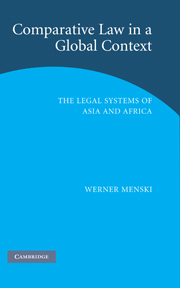Book contents
- Frontmatter
- Contents
- Preface and acknowledgments
- Table of cases
- Table of statutes
- List of abbreviations
- PART I Comparative framework
- Introduction: Globalisation and Asian and African legal systems
- 1 Comparative law and legal theory from a global perspective
- 2 Legal pluralism
- 3 Comparative jurisprudence: images and reflections of law
- PART II Regional comparisons in a global context
- Conclusion: towards global legal realism
- References
- Index
2 - Legal pluralism
Published online by Cambridge University Press: 09 November 2009
- Frontmatter
- Contents
- Preface and acknowledgments
- Table of cases
- Table of statutes
- List of abbreviations
- PART I Comparative framework
- Introduction: Globalisation and Asian and African legal systems
- 1 Comparative law and legal theory from a global perspective
- 2 Legal pluralism
- 3 Comparative jurisprudence: images and reflections of law
- PART II Regional comparisons in a global context
- Conclusion: towards global legal realism
- References
- Index
Summary
In the postmodern age, lawyers are re-learning that it remains impossible to draw clear boundaries between the legal and the non-legal. Debates about globalisation have precipitated this realisation (Flood, 2002). Several pioneers of legal pluralism studies provided useful starting points for further plurality-conscious analysis. Hooker (1975: 1) highlighted that ‘[l]egal systems typically combine in themselves ideas, principles, rules, and procedures originating from a variety of sources’, adding that ‘[b]oth in the contemporary world and historically the law manifests itself in a variety of forms and a variety of levels’ (p. 1). We know that law is everywhere (Twining, 2000: 1) as a social phenomenon, based on cultural foundations (Chiba, 2002: v), which the dominant positivist approach has unsuccessfully tried to ignore in order to privilege the state and its laws. Studying legal pluralism clearly ‘raises important questions about power’ (Griffiths, 2002: 289) and thus challenges legal centralist perspectives about state law.
While legal uniformity represents a utopian dream of philosophers, it is therefore an exception in social reality. Questions have arisen about where law begins and where it ends, but perhaps these are misleading questions. It is a common daily experience that normative pluralism, the coexistence of different bodies of norms within the same social space, is a fact of life. While we may struggle to understand the elusive and dynamic nature of norms, Twining (2000: 246) suggests that pluralism goes much deeper, so that ‘to understand law and legal ordering, the study of norms is almost never enough.
- Type
- Chapter
- Information
- Comparative Law in a Global ContextThe Legal Systems of Asia and Africa, pp. 82 - 128Publisher: Cambridge University PressPrint publication year: 2006

